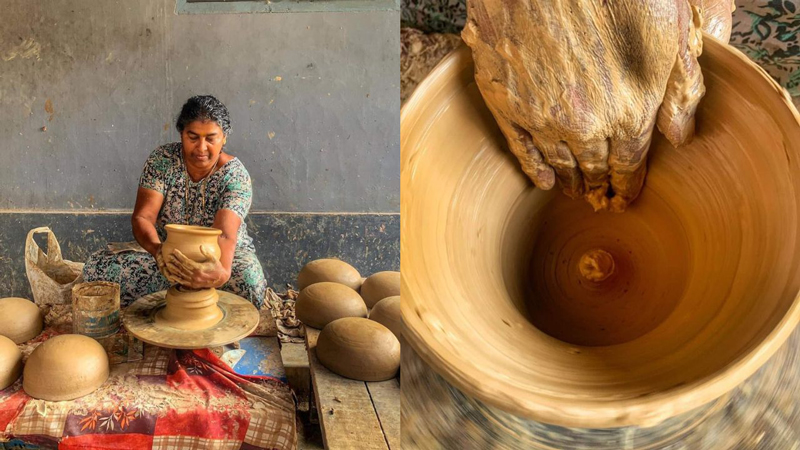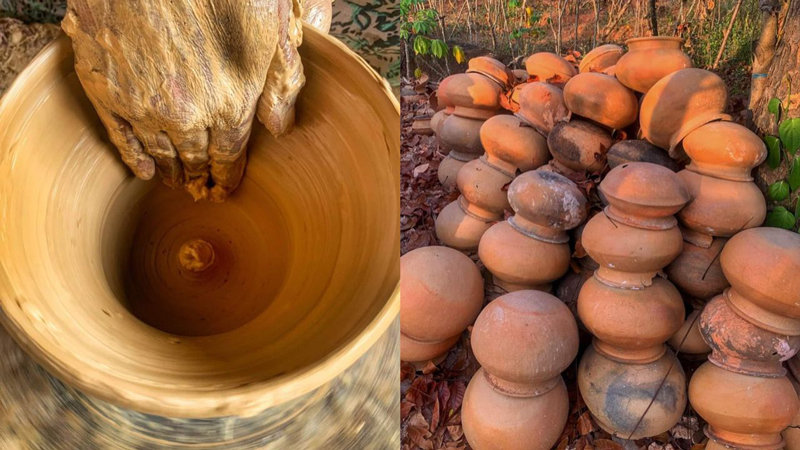Erikkulam, located in the serene district of Kasargod in North Malabar, has a long-standing tradition of pottery that has been an integral part of its cultural heritage. However, this ancient craft is facing challenges that threaten its existence, as modernization and changing agricultural practices impact the traditional way of life in this region.
Traditional Pottery Process:
For generations, the people of Erikkulam have been actively involved in pottery-making, a skill that has been passed down through families. Before the Vishu festival, a significant cultural event in Kerala, villagers would venture into the fields to gather clay and mud required for the pottery. This practice was usually conducted in tandem with the clearing of fields for vegetable farming. The clay would be collected, brought back home, and then skillfully shaped into pots of various sizes and designs.
The pottery-making process was deeply intertwined with the agricultural practices of the region. After the clay was collected, the holes left behind in the fields were filled, providing fertile ground for vegetable farming. This symbiotic relationship between pottery and agriculture showcased the sustainable way of life that had been maintained for generations.
Vishukani and Kanikalam:
Vishu, celebrated as the New Year in Kerala, involves the ritualistic setting up of Vishukani, an arrangement of auspicious items that symbolize prosperity and good fortune. In Erikkulam, the Kanikalam, holds the Vishukani display, representing the region’s cultural richness and religious observance.
Changing Landscape and Pottery’s Decline:
However, the traditional pottery craft is dwindling due to several factors. Modernization has brought about changes in lifestyle, with younger generations increasingly opting for alternative livelihoods. As a result, the knowledge and skills required for pottery-making are not being passed down to the next generation, putting the craft at risk of extinction. Once bustling with around 160 families in Erikkulam engaged in the pottery trade, the number of active artisans has dwindled due to the allure of alternative livelihoods and changing economic dynamics. Many artisans have been forced to seek other jobs to sustain their families, leading to a gradual abandonment of the craft that was once at the heart of their community.
Idle Pots: A Silent Reminder:
The consequences of this shift are evident in the numerous idle pottery pieces that now lie dormant within homes. Once created with care and skill, these pots now serve as silent reminders of a fading heritage. The once vibrant pottery-making process has given way to the quiet emptiness of unused pots, reflecting the challenges faced by a community grappling with economic uncertainties and the pressures of modern life.
Poothali Homestay and Cultural Preservation:
Poothali Homestay, situated in nearby Nileshwaram, has taken an active role in preserving the cultural heritage of Erikkulam. They offer immersive experiences that allow guests to witness and engage in the traditional pottery-making process. Visitors are given the opportunity to learn about the craft’s history, significance, and its connection to the local community. By showcasing this age-old tradition, Poothali Homestay not only supports the local artisans but also contributes to the preservation of cultural heritage.
As artisans transition to alternative sources of income, the cultural identity of Erikkulam is at risk of being diluted. The unique tradition of pottery, deeply intertwined with the agricultural rhythms of the region, has played a pivotal role in shaping the local way of life and fostering a strong sense of community. The erosion of this craft not only threatens the livelihoods of individual families but also weakens the cultural fabric that has defined Erikkulam for generations.
Hope for Revival:
While the challenges are significant, efforts like those undertaken by Poothali Homestay provide a glimmer of hope for the revival of traditional pottery in the region. By connecting tourists and visitors with the pottery-making process, these initiatives can generate renewed interest in the craft, potentially inspiring younger generations to embrace and carry forward their cultural heritage. Supporting local artisans through markets, workshops, and collaborative projects can create avenues for them to return to their ancestral craft and breathe new life into a fading tradition.
In conclusion, the transition from traditional pottery-making to alternative livelihoods has brought about both challenges and opportunities for the community of Erikkulam. The sight of idle pots within homes serves as a poignant reminder of the changes that have unfolded. However, with dedicated efforts to promote cultural awareness, community engagement, and the value of preserving heritage, there is a chance for the pottery craft of Erikkulam to rise once again, enriching the local culture and maintaining the link between generations past and those to come. Ready to experience Poothali Homestay? Click here

